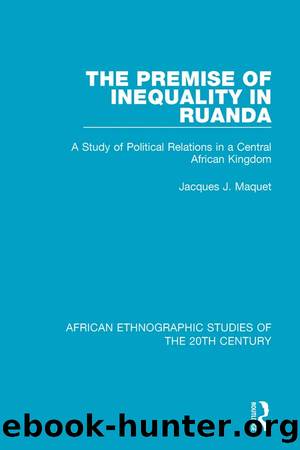The Premise of Inequality in Ruanda by Jacques J. Maquet

Author:Jacques J. Maquet [Maquet, Jacques J.]
Language: eng
Format: epub
ISBN: 9781138595743
Barnesnoble:
Publisher: Taylor & Francis
Published: 2018-08-22T00:00:00+00:00
(b) Taxes
Tributes and dues for which the land-chief was responsible were: any kind of labour, usually agricultural; uguhunika (putting into the granary), which consisted of a certain number of baskets of beans, peas, and sorghum to be delivered at harvest time; amavu (bananas to be used for brewing beer). These tributes were due from Hutu. The person who provided these things was the family head who was considered as the individual producer of the rugo. But between him and the land-chief, there was a hierarchy of persons responsible for the carrying out of the levies: sometimes the lineage head (if he was living in the same neighbourhood), then the neighbourhood head, and finally the hill-chief.
Through the hill-chief, too (according to 68 per cent, of the informants), the cattle-chief obtained jars of milk from the Tutsi. Moreover, the latter had to provide (according to 88 per cent.) inkuke, cows kept by the beneficiary in order that milk could be consumed fresh.
These tributes were centralized in the royal residence of the district which was occupied by the king when he was travelling in the district. This residence was called rugo, the ordinary word meaning a compound dwelling. 95 per cent, of our informants remembered several names of royal district residences and 86 per cent, had not forgotten the name of the residence in the district where they used to live as children.
Revenues of a district were either reserved to the king himself or were granted to one of the kingâs wives. In the first case, the residence was called ingaligali and was administered by a kingâs concubine (umuja, girl-servant).
Administrative officers collecting tributes, had the right to keep a part for their own benefit. According to 95 per cent, of our informants, the hill-chiefs had the right to deduct some agricultural produce, of which they could keep about a third. Then the land-chiefâaccording to 99 per cent.âcould also keep a part of it, probably a little less than a third. For tribute labour, the hill-chief handed over to the residence the number of labourers requested but could have the others to work for himself.
Download
This site does not store any files on its server. We only index and link to content provided by other sites. Please contact the content providers to delete copyright contents if any and email us, we'll remove relevant links or contents immediately.
| Africa | Americas |
| Arctic & Antarctica | Asia |
| Australia & Oceania | Europe |
| Middle East | Russia |
| United States | World |
| Ancient Civilizations | Military |
| Historical Study & Educational Resources |
Never by Ken Follett(2941)
Machine Learning at Scale with H2O by Gregory Keys | David Whiting(2352)
The Man Who Died Twice by Richard Osman(2327)
Fairy Tale by Stephen King(2126)
Will by Will Smith(2099)
Rationality by Steven Pinker(1790)
The Dark Hours by Michael Connelly(1601)
The Dawn of Everything: A New History of Humanity by David Graeber & David Wengrow(1599)
Principles for Dealing With the Changing World Order: Why Nations Succeed and Fail by Ray Dalio(1400)
Friends, Lovers, and the Big Terrible Thing by Matthew Perry(1372)
A Short History of War by Jeremy Black(1318)
HBR's 10 Must Reads 2022 by Harvard Business Review(1271)
Go Tell the Bees That I Am Gone by Diana Gabaldon(1259)
Can't Hurt Me: Master Your Mind and Defy the Odds - Clean Edition by David Goggins(1254)
515945210 by Unknown(1224)
Fear No Evil by James Patterson(1129)
443319537 by Unknown(1086)
Works by Richard Wright(1029)
Going There by Katie Couric(1004)
